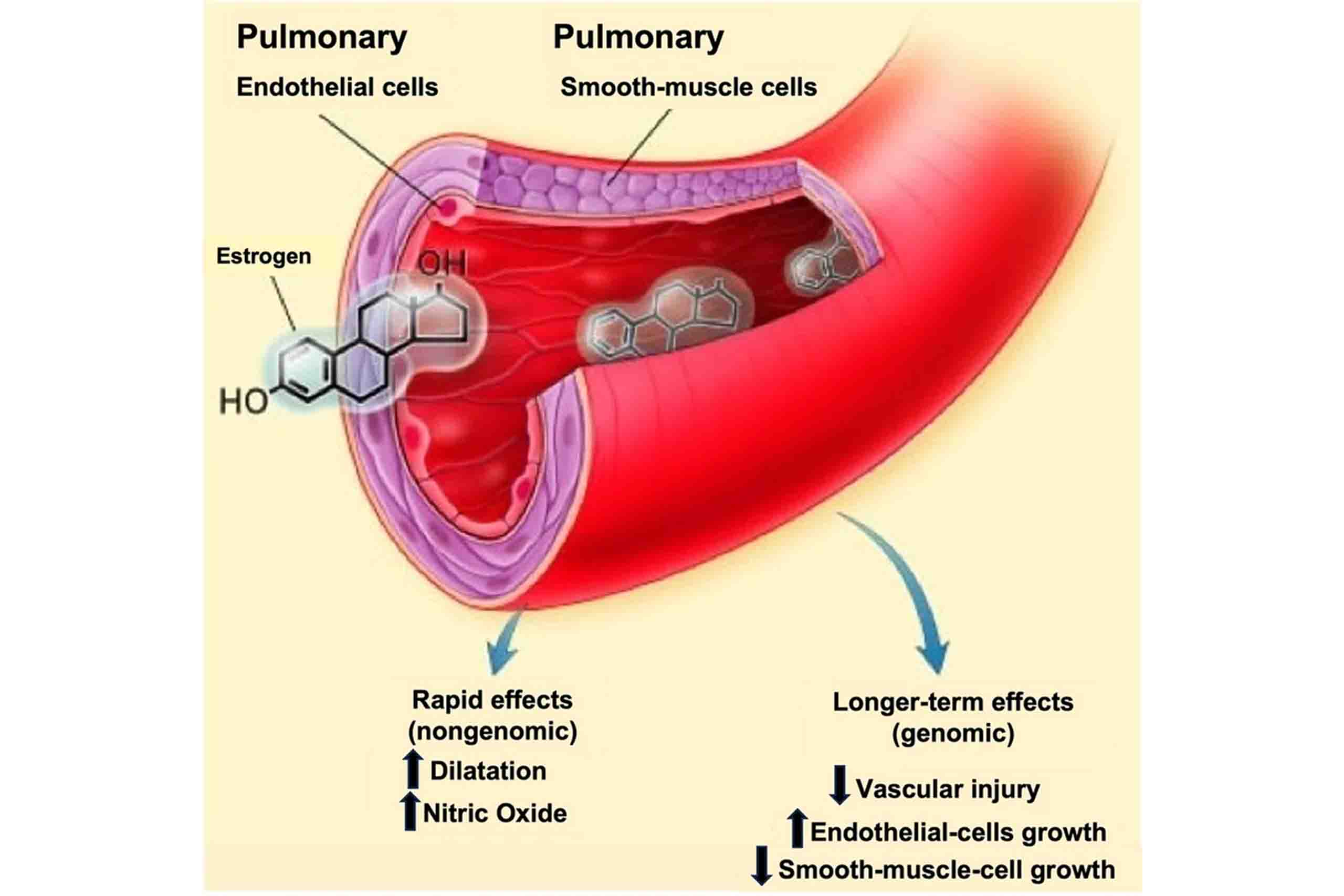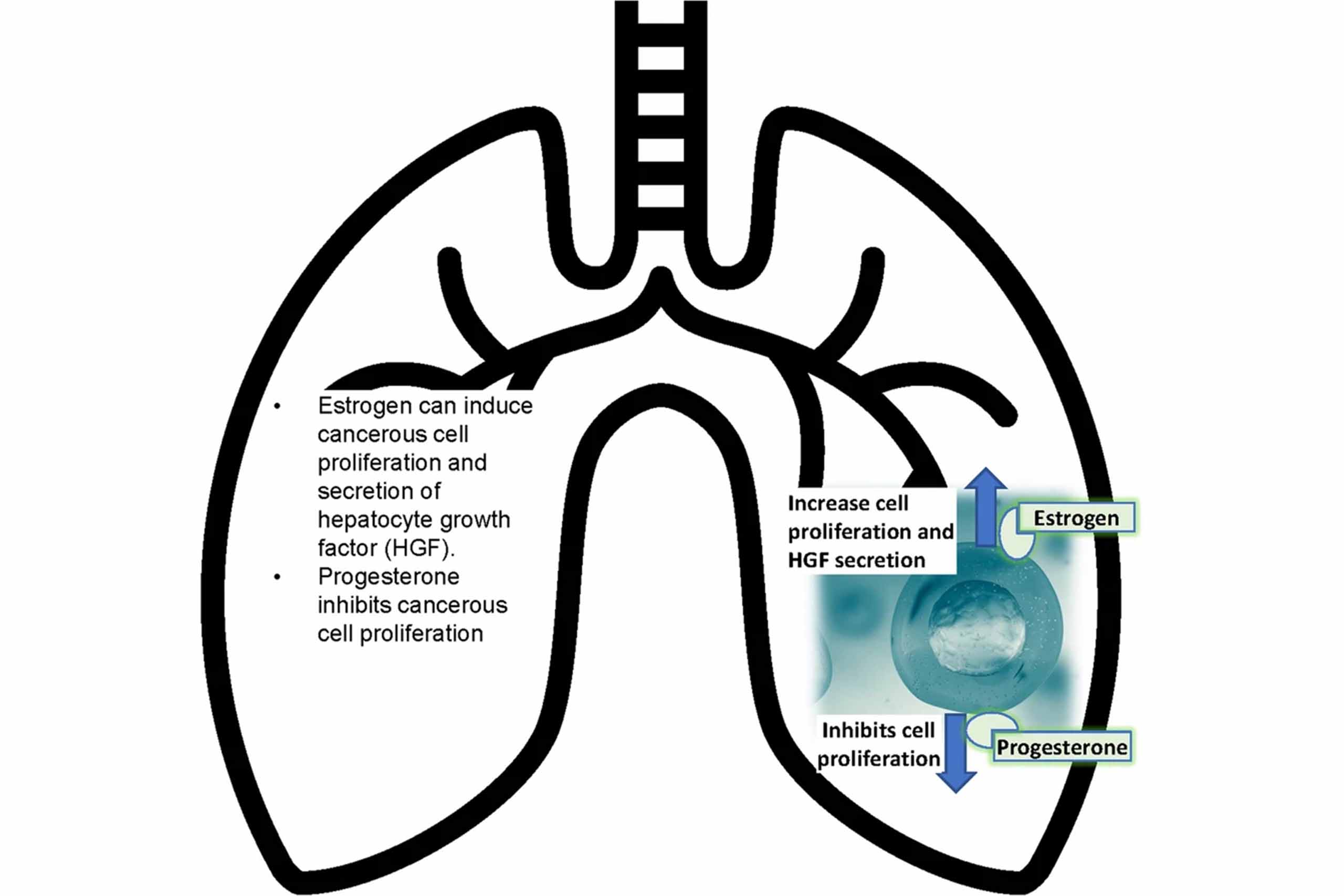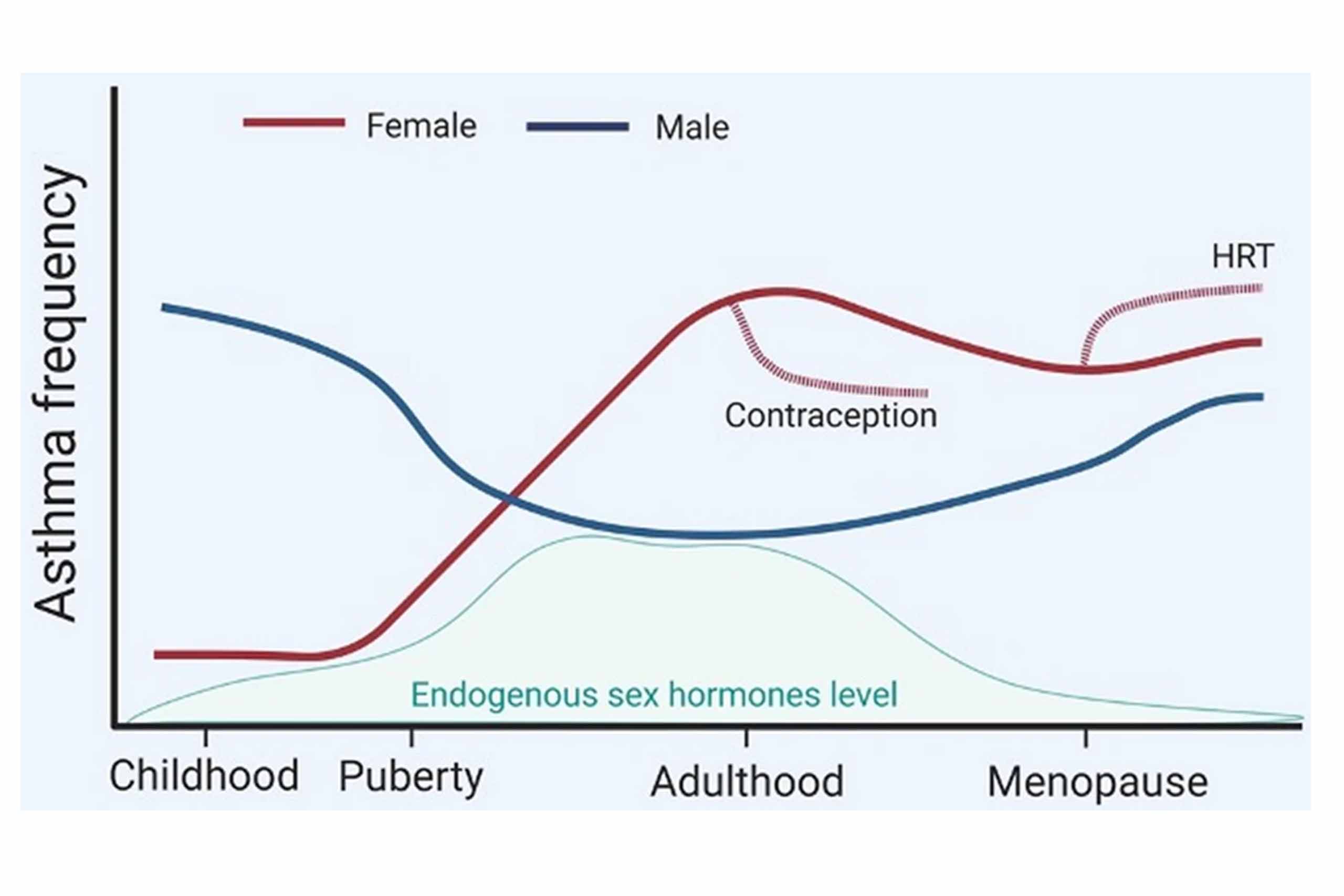Effects of Hormone Replacement Therapy on Lung Health and Respiratory Disease
Recent research published by Springer has ignited a heated debate among scientists and captured the keen interest of older women using hormone replacement therapy (HRT).
This discovery unveils a profound connection between HRT and lung conditions, from asthma to chronic obstructive pulmonary disease (COPD) and beyond.
Read on to explore the effects of hormone replacement therapy on lung health.
RELATED: Latest Research on Hormone Replacement Therapy in 2023 | Current Findings and Updates

Research Shows Long-term HRT Helps Prevent Permanent Damage to Lung Function in Middle-aged Women
Gender Disparity in Lung Disease: Why is It the Case?
Did you know your gender may affect how likely you are to develop respiratory diseases?
Research shows idiopathic pulmonary fibrosis affects males at double the rate, while cystic fibrosis and pulmonary hypertension exhibit greater severity in women. Certain chronic respiratory diseases are also influenced by sex, such as:
- Lung cancer
- Asthma
- COPD
A complex interplay of factors, including structural distinctions of the lungs and hormones, is thought to play a role in the gender differences in lung diseases.
First, let’s talk about structure.
Female lungs, typically smaller and with fewer respiratory bronchioles (the tiny tubes that connect the alveoli to the bronchi) and smaller airways, contrast with their male counterparts, whose larger luminal airway area relative to lung size stands out.
In other words, regarding how our lungs look and function, men and women are not the same. For women, their smaller airways might make them more prone to specific issues, while men’s larger airways could make them less vulnerable.
Do these structural distinctions influence the differences, as mentioned above, in susceptibility and severity of respiratory diseases between genders?
It’s an intriguing possibility.
But wait, there’s more to the story. What about hormones?
The dynamic sex hormone cycle experienced by females throughout life further complicates the picture. During puberty, girls experience a surge in hormones, such as estrogen and progesterone. This hormone increase can be protective for lung health, making girls less susceptible to respiratory diseases at this stage.
In contrast, declining estrogen during menopause can increase vulnerability and severity, exacerbating the gender differences in respiratory diseases.
RELATED: 10 Symptoms of Low Estrogen in Women
Effects of Hormone Replacement Therapy on Lung Health
You may not know about this, but the heart and lungs are our body’s oxygen partners that keep us alive. The cardiovascular and respiratory systems work in tandem to ensure the body receives oxygen and eliminates carbon dioxide.
Research highlights estrogen’s specific impact on the cardiovascular system, particularly the vasculature. Interestingly, estrogen in hormone replacement therapy (HRT) doses can benefit the circulatory system. So, how does estrogen affect the heart?
In the cardiovascular system, estrogen can:
- Reduce atherosclerosis and inflammation in blood vessels
- Act as an antioxidant, preserving vasoreactivity
- Act as a vasodilator, relaxing blood vessels
But what about the connection of estrogen to our respiratory function?
The broader implications of estrogen’s cardiovascular effects on other systems, such as the respiratory system, are subjects of ongoing research. Evidence suggests that estrogen used in HRT might positively impact overall pulmonary functions in women.
The European Community Respiratory Health Survey examined the effects of hormone replacement therapy on lung health. It found that long-term oral HRT was associated with less decline in lung function over 20 years in postmenopausal women. The decline in lung function observed with menopause is likely due to decreasing estrogen levels.
However, some studies reported conflicting results, suggesting that using estrogen in HRT might negatively affect lung function, especially in cases that will be discussed below.
RELATED: HRT and Heart Disease: Research Shows Menopausal Hormone Therapy Does Not Increase Risks for CVD

Hormone Replacement Therapy in Respiratory Diseases
Lung Cancer
Estrogen’s impact on tumor growth in female reproductive organs through interactions with estrogen receptors is well-documented and is known as estrogen-dependent cancers.
However, its role in lung cancer is an entirely different subject.
While it’s believed that exogenous hormones, as in HRT, might influence lung cancer development, the underlying biological mechanisms remain unclear.
Lung cancer stands as one of the most prevalent and deadly cancers globally. Interestingly, women, particularly non-smokers, appear to be more vulnerable to developing lung adenocarcinoma, with generally better survival rates than men.
Also, differences in susceptibility to lung cancer have been observed between:
- Premenopausal and postmenopausal women
- Women and men
This raises questions about the relationship between:
- Gender
- Hormones
- Lung cancer
Studies have identified estrogen and progesterone receptors in healthy lung cells and tumor cells, suggesting that estrogen may promote lung tumorigenesis while progesterone inhibits it. However, studies examining the use of estrogen in HRT and its impact on incident lung cancer have produced conflicting results.
Therefore, hormonal changes in women could also play a role, with research indicating that estrogen might protect against lung cancer-related mortality.
Conflicting results found in studies may be due to:
- Unspecified HRT formulations
- Lack of the duration of use
- Limited adjustments for tobacco use
- A focus on non-smokers
To better understand the influence of estrogen on lung cancer, monitoring estrogen levels during HRT may provide valuable insights into the disease’s progression and survival.
RELATED: Hormone Therapy and Cancer: Why You Should No Longer Be Afraid

Asthma
Asthma, a chronic disease marked by recurring symptoms like wheezing, breathlessness, coughing, and chest tightness, is influenced by internal and external factors, including:
- Inflammation
- Airway sensitivity
- Respiratory infections
- Allergic conditions
- Chemical irritants
However, it has been recently recognized that personal factors such as age and gender can also affect how asthma manifests.
Changes in reproductive hormones with age and gender appear to play a role. Accordingly, women exhibit higher rates of adult-onset asthma and hospital admissions for the condition. Also, asthma severity seems to fluctuate with the menstrual cycle.
In this context, HRT is thought to affect asthma in women, either in good or bad ways.
Some women experience exacerbations due to HRT, potentially linked to genetic variations in estrogen receptors. Meanwhile, HRT using progesterone and estrogen can positively impact lung function by relaxing bronchial smooth muscle. Synthetic progesterone alone may also have androgenic properties that improve pulmonary function.

COPD
Chronic obstructive pulmonary disease (COPD), a respiratory condition primarily associated with smoking, is showing an alarming increase in women.
Yet, interestingly, smoking habits do not fully explain this phenomenon.
Research indicates that females, even those who smoke less, develop COPD faster than their male counterparts. In non-smokers with COPD, females also constitute the majority of cases (up to two-thirds).
The growth-promoting effects of estrogen are suspected to be the culprits. Estrogen metabolism in the lungs can lead to oxidative stress, potentially contributing to cell proliferation and the development of COPD.
Animal models demonstrate that female mice exposed to cigarette smoke exhibit damage to lung tissue more rapidly than males. Also, estradiol increases certain enzymes in the lungs, making the lungs more vulnerable to oxidative damage from cigarette smoke.
Still, regarding the effects of HRT on COPD, evidence is limited but intriguing:
- In older women aged over 65 years, current HRT use is associated with improved lung function, implying a short-term effect on the bronchial tree.
- However, some other reports suggest a subgroup of COPD patients experience poorer COPD symptom control with HRT, possibly due to variations in the estrogen receptor gene.
Pulmonary Hypertension
Pulmonary hypertension (PH), a life-threatening condition affecting the pulmonary blood vessels, exhibits a gender disparity with more female cases.
A study also revealed that 86% of postmenopausal and 71% of premenopausal women with PH reported using HRT at some point in the past 10 years.
Therefore, estrogen, mainly through HRT, is thought to play a crucial role by damaging the pulmonary vasculature. While research on HRT’s effects on PH is conflicting, it’s crucial to specify the type of PH a patient may have.
There are 5 types of pulmonary hypertension:
- Pulmonary arterial hypertension (PAH)
- PH due to left heart disease
- PH associated with lung diseases
- PH resulting from chronic thromboembolic pulmonary hypertension
- PH secondary to various miscellaneous diseases
What truly captivates scientists’ curiosity is the heritable PH associated with genetic mutations, like the BMPR2 gene.
Estrogens seem to suppress the expression of the BMPR2 gene, potentially increasing susceptibility to PH. Furthermore, specific estrogen metabolites may promote the proliferation of pulmonary vascular cells, further complicating the relationship between estrogens, gender, and susceptibility to PH.
Still, research has revealed mixed outcomes with HRT and PH.
Some studies suggest a reduced risk of PH in specific scenarios, while others report a rapid onset of heritable PH after HRT. Estrogen levels during HRT use might explain these variations, depending on the specific PH group.
Bottom Line
The effects of hormone replacement therapy on lung health can be attributed to estrogen potentially influencing various lung conditions. It’s a complex interplay—HRT’s effects on respiratory diseases like asthma, COPD, and pulmonary hypertension remain under study.
While HRT may offer some benefits, especially in middle-aged and menopausal women, it carries potential risks and requires vigilant monitoring. The interaction between gender, genetics, and hormone exposure adds complexity to understanding how HRT influences lung health, making it an area of continued exploration.
References:
- Eliyahu E. et al. (2023). Effects of Hormone Replacement Therapy on Women’s Lung Health and Disease. Springer Nature.
Yunique Medical provides FUNCTIONAL MEDICINE for optimized health and performance. We offer customized, scientifically advanced treatments to create a new state of human thriving. Why be ordinary when you can be optimal?
HUMAN 2.0 begins here!
Contact us to schedule your FREE consultation at one of our three locations in Florida – Ocala, Fruitland Park (The Villages), and Daytona.
UP NEXT:
Effects of Intermittent Hypoxic Training (IHT) on the BrainCan Hormones Affect Your Blood Sugar? Learn Diabetes & Menopause
Low-impact HIIT Workout Helps With Active Prehabilitation Before Surgery
Hyperthermic Ozone & Carbonic Acid Transdermal Technology [HOCATT]

